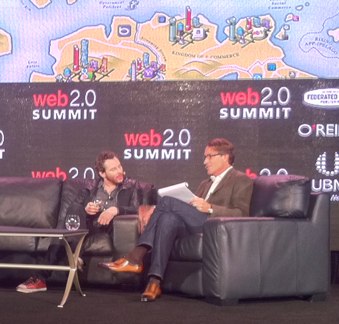Sean Parker doesn’t think that Facebook has a privacy problem. Kicking off the Web 2.0 Summit today, when pressed on how Facebook is increasingly becoming creepy in terms of how much of our lives it is tracking, he notes, “There is good creepy, and there is bad creepy.” But from his perspective, the privacy issues are manageable as long as users are able to control what and how they share what they do online.
“I don’t think privacy is Facebook’s biggest problem,” says Parker, who was the company’s founding president. “Facebook’s biggest problem is the glut of information from power users.” With the recent changes announced last month at F8, especially the new Ticker which automates sharing from apps, the stream of status updates is now a deluge. Of course, this brings up new privacy concerns when people are not aware how much they are sharing or how to turn it off, but that is a temporary issue. People will learn how to control their streams.
The bigger issue, Parker suggests, is people who want to share everything and overwhelm their friends on purpose. What do you do with these over-sharers? Facebook can encourage them to move on to Twitter or Google+ (hello, Robert Scoble). But that won’t work in the long term because the power users are the ones who create most of the content on Facebook (or anywhere on the Web, for that matter). The answer, he thinks, is to give the power users more tools like Smart Lists to help them direct their broadcasts to distinct groups. (Sounds a lot like Google+ Circles).
One of the services which is currently inundating people’s Facebook tickers is Spotify, which Parker is involved in as a very active chairman. He acknowledges that there needs to be a better balance between passive and active sharing. But his thoughts on how Facebook is helping to accelerate Spotify’s adoption were more on point
Asked, what the recent integration with Facebook does for Spotify, he replies: “The obvious thing is it gives access to Facebook’s roughly 800 million users and it allows music to go massively viral. The social graph has always been a great promulgator of information. We didn’t see it as a network of profiles, we always saw it as a way to promulgate media. You saw this with videos from Youtube. But because of licensing issues there was no way to enable that same virality with music.”
Although Spotify got stage time at Facebook’s F8 conference, it launched with many other music services on the Facebook platform, including MOG and Rdio. “It would have been better if we had launched solo,” quips Parker, before pointing out that the terms of the partnership is no different for Spotify than for anyone else.
A recent New York Post article recently reported that Parker and Facebook CEO Mark Zuckerberg were seen arguing outside a Hollywood nightclub about Spotify’s lack of exclusivity. “That story is amazing.” says Parker. “I love this story. It shows the potential for one little irrelevant, largely incorrect rumor to spark this large explosion of media. Mark and I were discussing this, but we weren’t having a yelling match on Hollywood Boulevard.”
Reflecting on the difference between Napster (where Parker also was a co-founder more than a decade ago) and Spotify, Parker says, “The potential to dis-intermediate the gatekeepers was there, but first you needed to create the right product” and get the music industry to play ball. “Unfortunately, it took the outright collapse of the music industry to compel them to do deals.” He notes that the size of the music industry dropped from $48 billion at its peak to $12 billion, and it is still going down. And now they are finally talking.
So is it all Spotify’s game to lose now? “The world is changing so quickly that it is very hard to get anything right for long,” cautions Parker. “I never gave up on this dream of a frictionless service that would enable music sharing. The greatest music being made wasn’t being heard by the greatest number of people.” Now, with everyone on Facebook inundating their streams and Tickers with every random tune they happen to hit play on, you can’t say that remains a problem.
Parker didn’t say much about his new startup AirTime, but apparently Marc Benioff, who was onstage after him, just invested in it.
